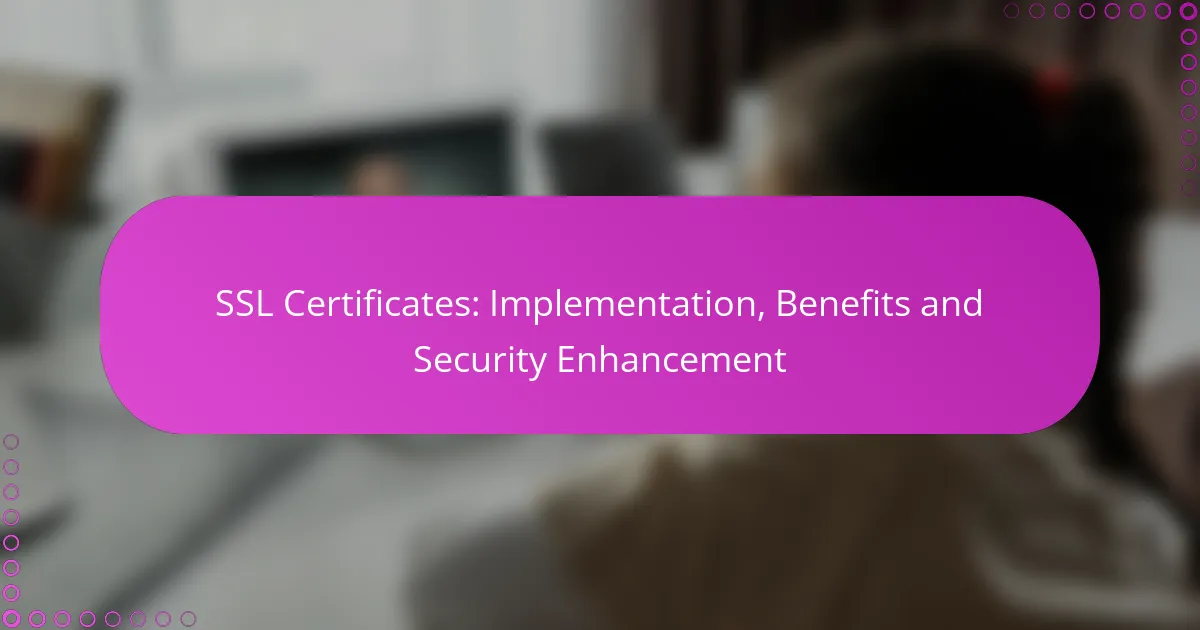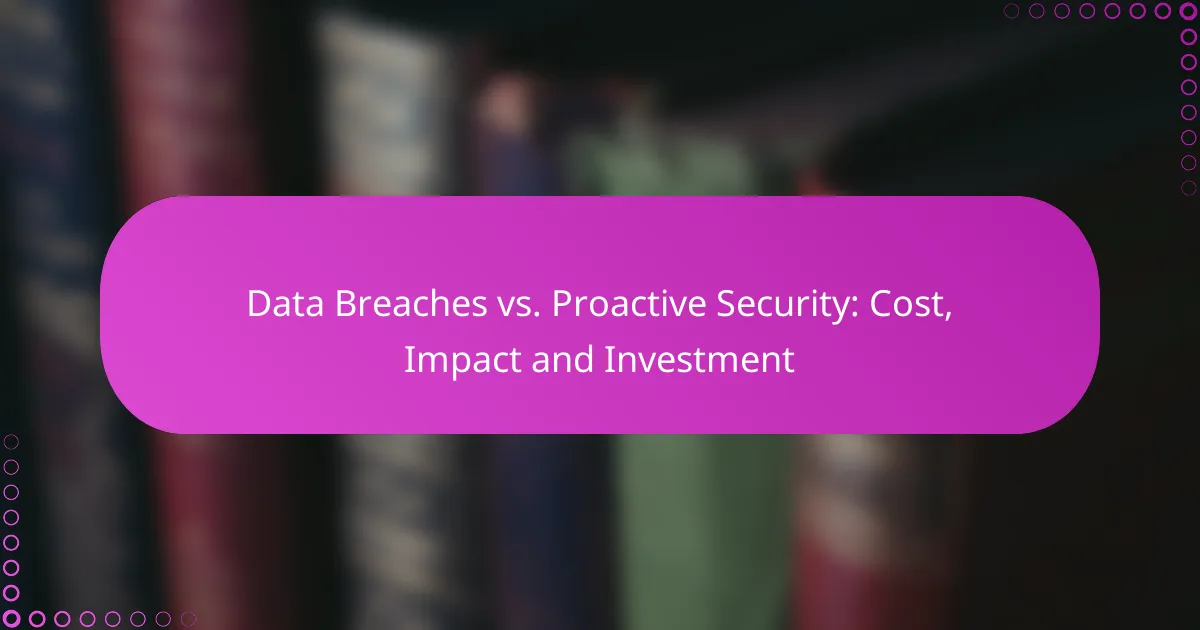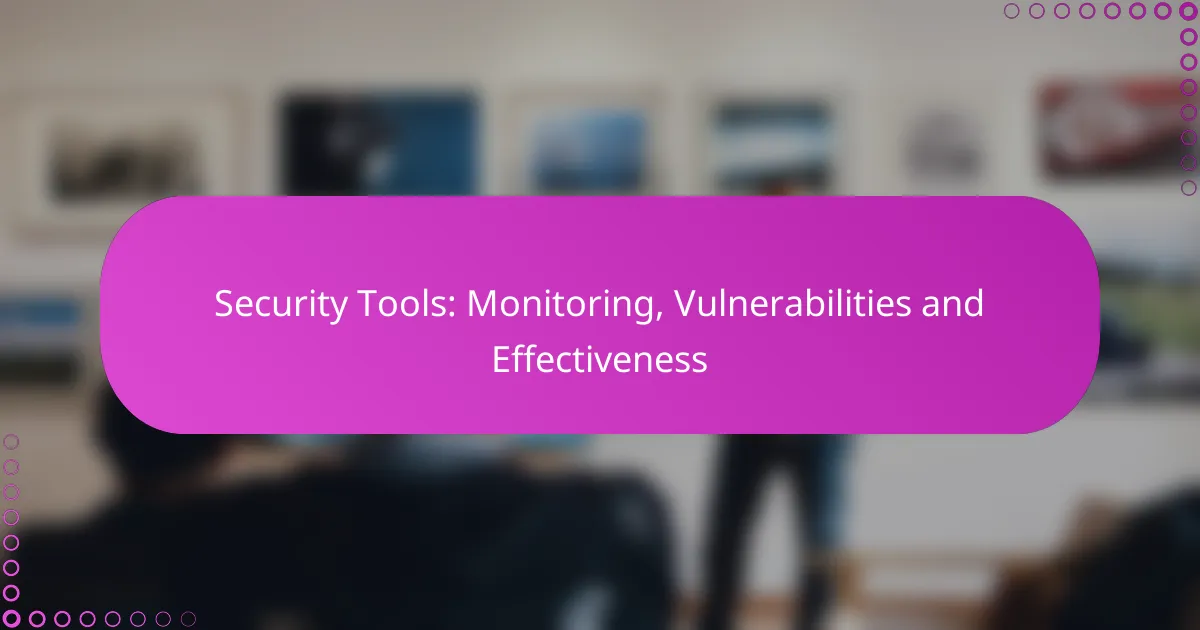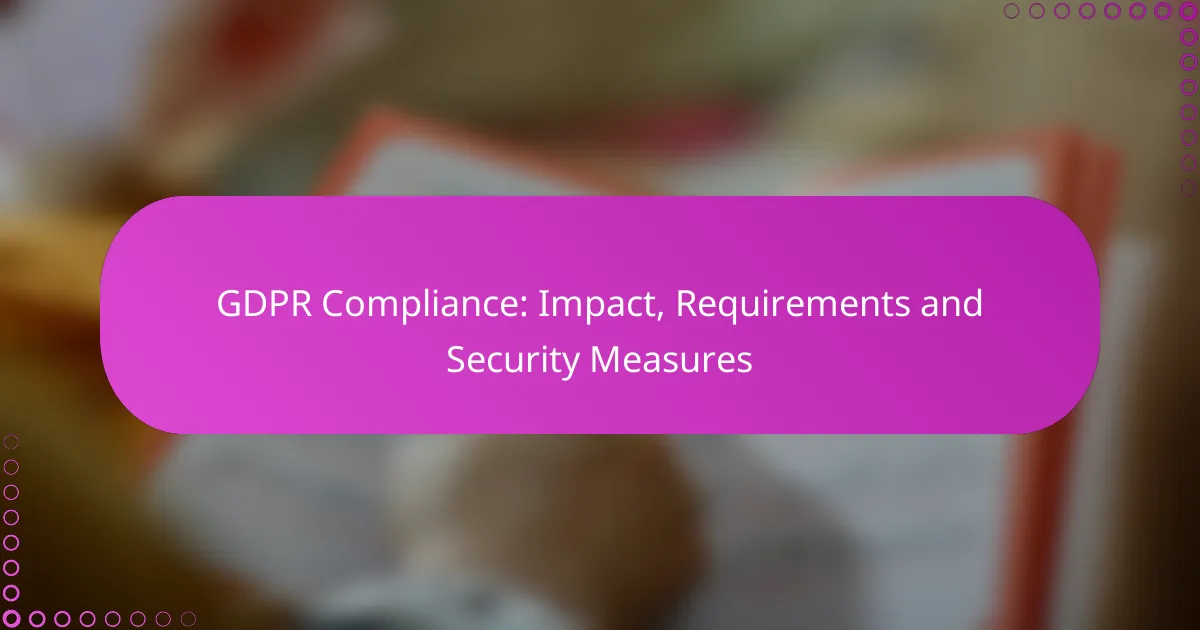Implementing SSL certificates is vital for securing online communications and protecting sensitive user data. By encrypting the data transmitted between a user’s browser and a web server, SSL enhances security, builds customer trust, and can even improve search engine rankings. For any website handling confidential information, SSL is an essential component of a robust security strategy.
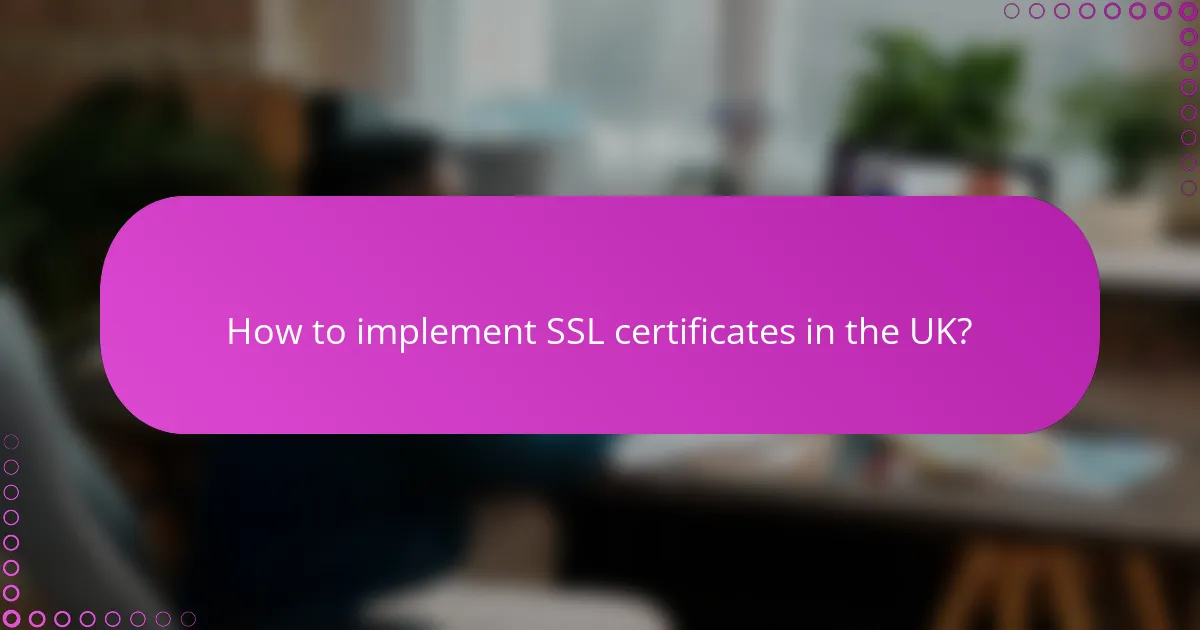
How to implement SSL certificates in the UK?
Implementing SSL certificates in the UK involves obtaining a certificate from a trusted provider and configuring your web server to use it. This process ensures secure connections for your website, protecting user data and enhancing trust.
Step-by-step installation guide
To install an SSL certificate, start by generating a Certificate Signing Request (CSR) on your server. This request includes your public key and company details, which you will submit to your SSL provider.
Once you receive the SSL certificate from the provider, install it on your web server. The installation process varies depending on the server type, so refer to your server’s documentation for specific instructions.
After installation, ensure that your website is accessible via HTTPS. You can test this by entering your domain with “https://” in a web browser.
Choosing the right SSL provider
Selecting an SSL provider is critical for ensuring security and trust. Look for providers that are widely recognized and offer various types of certificates, such as Domain Validated (DV), Organization Validated (OV), and Extended Validation (EV) certificates.
Consider factors like customer support, warranty levels, and the provider’s reputation. Pricing can vary significantly, so compare options to find a balance between cost and features that meet your needs.
Configuring web servers for SSL
Configuring your web server for SSL requires updating your server settings to enable HTTPS. This often involves modifying configuration files to point to your SSL certificate and private key.
Ensure that you redirect all HTTP traffic to HTTPS to maintain security. This can typically be done using rewrite rules in your server configuration.
Regularly check for updates and renew your SSL certificate before it expires to avoid any interruptions in secure service.
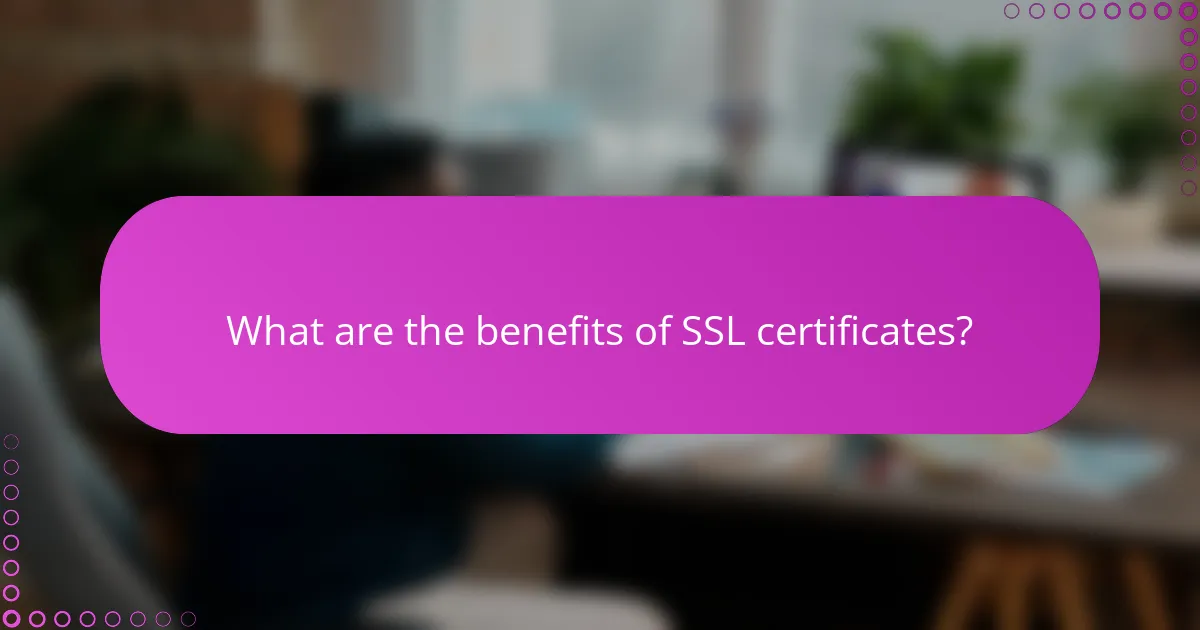
What are the benefits of SSL certificates?
SSL certificates provide essential benefits, including enhanced security for online transactions, improved search engine rankings, and increased customer trust. Implementing SSL is crucial for any website handling sensitive data, as it encrypts communications between the server and users.
Enhanced website security
SSL certificates significantly enhance website security by encrypting data transmitted between the user’s browser and the web server. This encryption protects sensitive information, such as credit card numbers and personal details, from being intercepted by malicious actors.
To implement SSL, website owners need to obtain a certificate from a trusted Certificate Authority (CA) and install it on their server. Regularly updating and renewing the certificate is essential to maintain security standards.
Improved SEO rankings
Websites with SSL certificates often experience improved SEO rankings. Search engines like Google prioritize secure sites, which can lead to better visibility in search results. This can translate to increased traffic and potential revenue.
To take advantage of this benefit, ensure that your website is fully migrated to HTTPS, including all internal links and resources. Regularly monitor your site’s performance to assess the impact of SSL on your SEO strategy.
Increased customer trust
Having an SSL certificate increases customer trust by signaling that a website is secure and reliable. Users are more likely to engage with a site that displays the padlock icon in the address bar, indicating a secure connection.
To foster trust, clearly display security badges and provide information about your SSL certificate on your website. This transparency can enhance user confidence, encouraging them to complete transactions and share personal information.
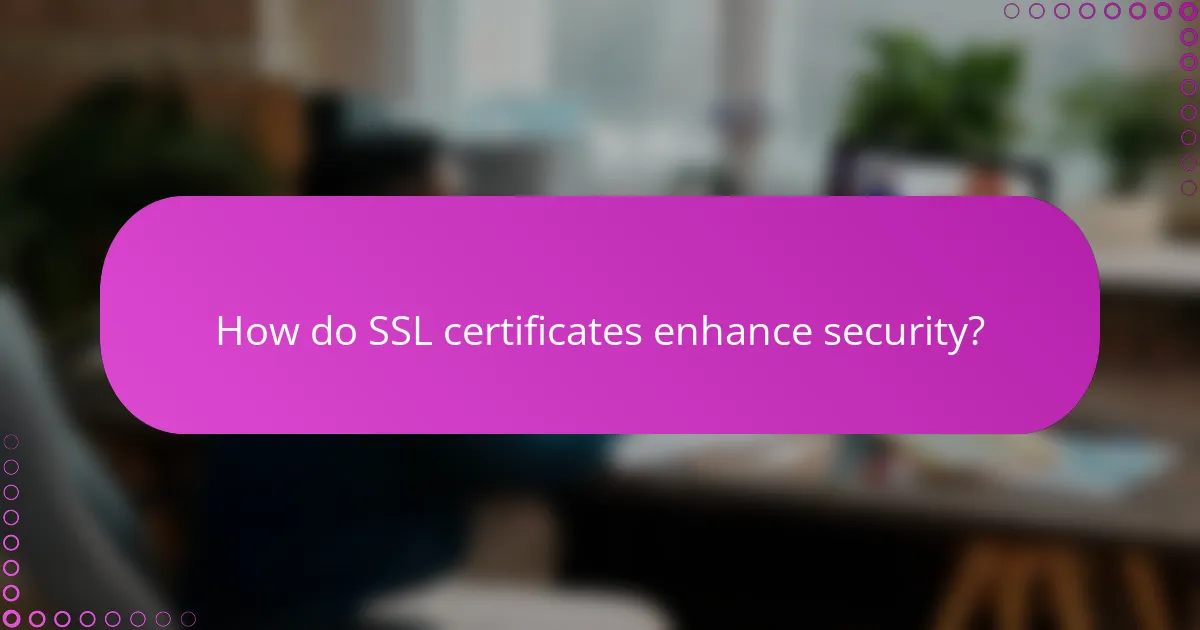
How do SSL certificates enhance security?
SSL certificates enhance security by encrypting data transmitted between a user’s browser and a web server, ensuring that sensitive information remains confidential. This encryption protects against eavesdropping and tampering, significantly reducing the risk of data breaches.
Data encryption methods
SSL certificates utilize various encryption methods to secure data. The most common protocols include TLS (Transport Layer Security), which employs symmetric and asymmetric encryption techniques. Symmetric encryption uses a single key for both encryption and decryption, while asymmetric encryption uses a pair of keys—one public and one private.
For practical implementation, organizations should ensure they use strong encryption algorithms, such as AES (Advanced Encryption Standard) with 256-bit keys. Regularly updating SSL certificates and configurations is crucial to maintaining robust security.
Protection against phishing attacks
SSL certificates provide a layer of protection against phishing attacks by verifying the authenticity of a website. When users see a padlock icon in their browser’s address bar, it indicates that the site is secure and that their data is encrypted, which helps build trust.
To maximize protection, businesses should implement Extended Validation (EV) SSL certificates, which require a more rigorous verification process. This not only enhances security but also visibly distinguishes legitimate sites from potential phishing attempts, making it easier for users to identify safe websites.
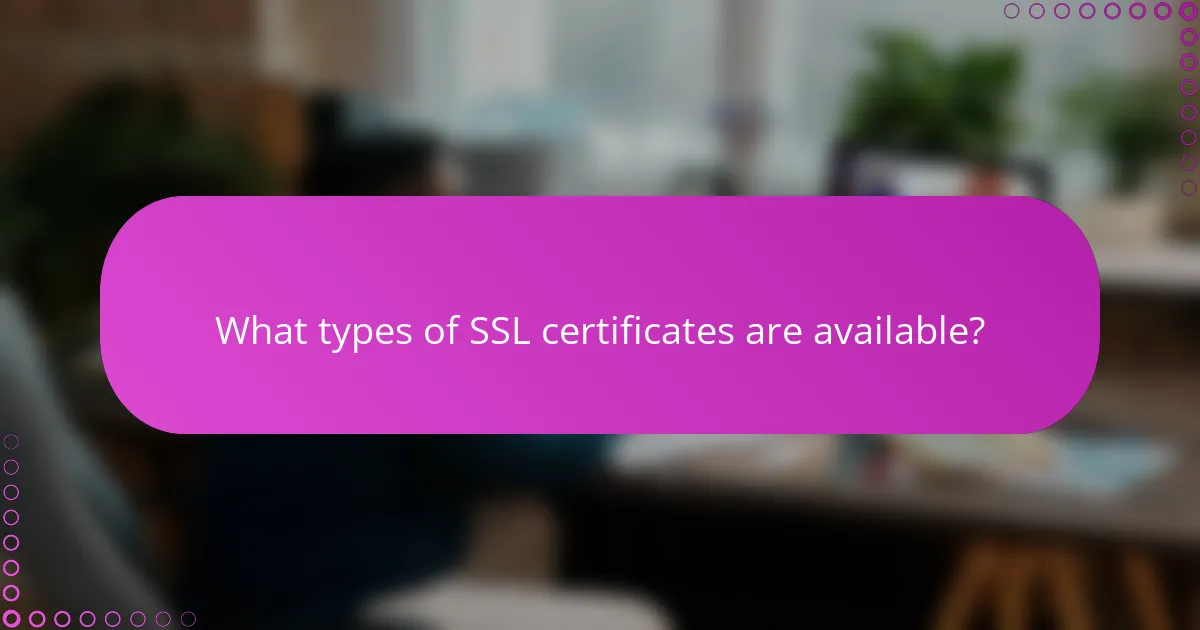
What types of SSL certificates are available?
There are three main types of SSL certificates: Domain Validated (DV), Organization Validated (OV), and Extended Validation (EV). Each type varies in the level of validation and trust it provides, catering to different security needs and organizational requirements.
Domain Validated (DV) certificates
Domain Validated (DV) certificates are the most basic type of SSL certificate. They verify that the applicant has control over the domain, typically through email or DNS verification. This process is quick, often completed within minutes, making DV certificates an ideal choice for personal websites or small businesses.
While DV certificates provide encryption, they do not offer any information about the organization behind the website. This lack of organizational validation can lead to lower trust from users, especially for e-commerce sites.
Organization Validated (OV) certificates
Organization Validated (OV) certificates provide a higher level of security than DV certificates by verifying the organization’s identity. This involves checking the organization’s name, address, and phone number against official records. The validation process typically takes a few days to complete.
OV certificates are suitable for businesses that want to establish credibility and trust with their customers. They display the organization’s name in the certificate details, which can enhance user confidence, particularly for sites handling sensitive information.
Extended Validation (EV) certificates
Extended Validation (EV) certificates offer the highest level of trust and security. The validation process is rigorous, requiring extensive documentation and verification of the organization’s legal, physical, and operational existence. This process can take several days to weeks.
Websites with EV certificates display a green address bar in most browsers, indicating a high level of trust. This makes EV certificates ideal for financial institutions, e-commerce platforms, and any site where user trust is paramount. However, they are more expensive than DV and OV certificates, which is a consideration for budget-conscious organizations.
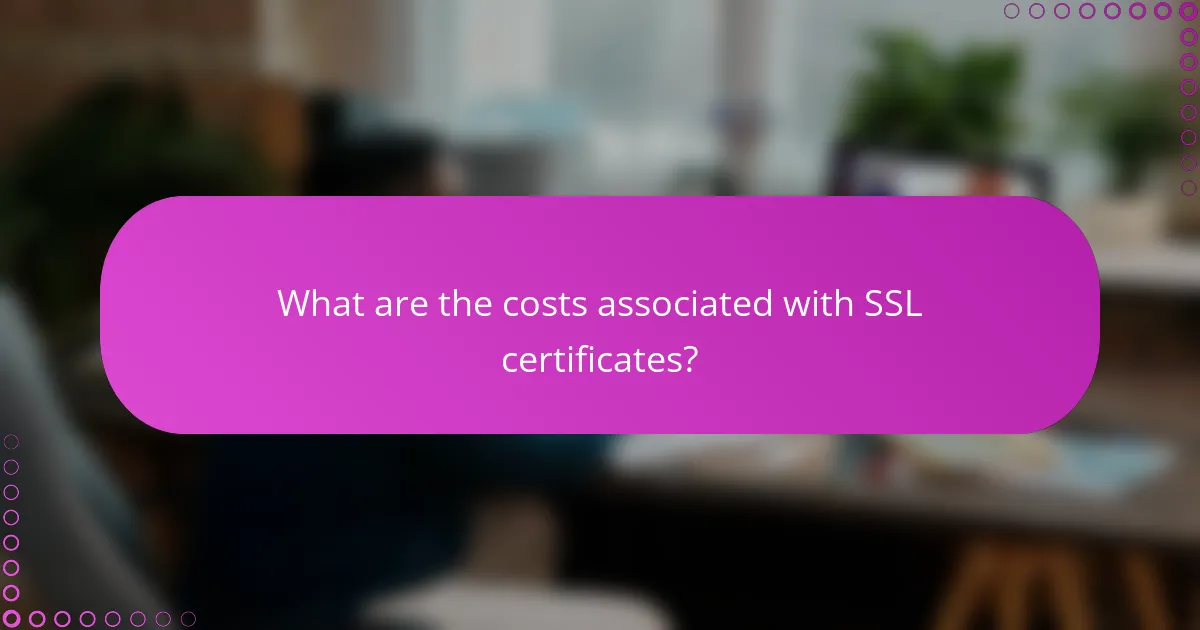
What are the costs associated with SSL certificates?
The costs associated with SSL certificates can vary significantly based on the type of certificate and the issuing authority. Generally, businesses can expect to pay anywhere from a few dollars to several hundred dollars annually, depending on their specific needs and the level of validation required.
Pricing ranges for different types
SSL certificates typically fall into three main categories: Domain Validation (DV), Organization Validation (OV), and Extended Validation (EV). DV certificates usually cost between $10 to $50 per year, while OV certificates range from $50 to $150 annually. EV certificates, which offer the highest level of trust, can cost between $100 to $500 or more each year.
Additionally, some providers offer multi-domain or wildcard certificates that can secure multiple subdomains. These can range from $100 to over $1,000 depending on the number of domains and the level of validation.
Factors influencing SSL certificate costs
Other considerations include the length of the certificate term, with longer terms often providing better value, and any additional features such as warranty, support, or malware scanning services. Businesses should evaluate their specific needs to choose the most cost-effective option.
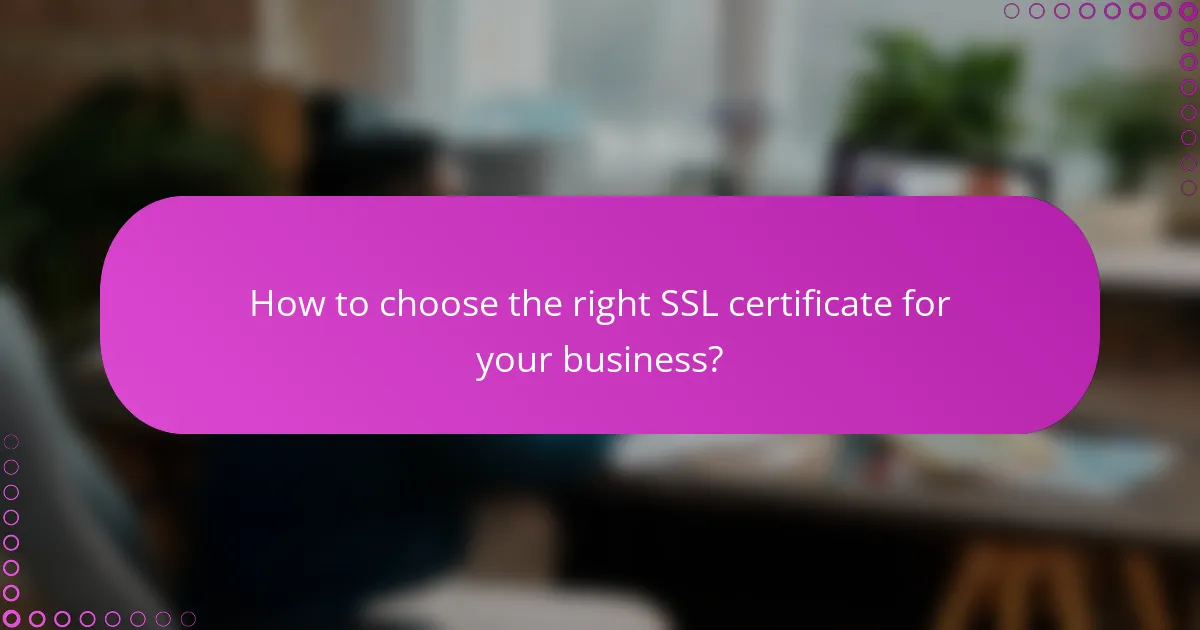
How to choose the right SSL certificate for your business?
Selecting the appropriate SSL certificate for your business involves understanding your specific security needs and the types of certificates available. Consider factors such as the size of your organization, the number of domains you need to secure, and your budget.
Assessing business needs
Begin by identifying the primary purpose of your website. If you handle sensitive customer data, such as payment information, a higher level of encryption is essential. For smaller websites or blogs, a basic certificate may suffice.
Evaluate the number of domains and subdomains you need to secure. A single-domain certificate is suitable for one website, while a wildcard certificate can cover multiple subdomains under a single domain. Multi-domain certificates offer flexibility for businesses with various sites.
Comparing SSL providers
When comparing SSL providers, look for reputable companies with a history of reliability and strong customer support. Check for reviews and ratings from other businesses to gauge their performance.
Consider the pricing structure and renewal costs, as these can vary significantly. Some providers offer competitive initial pricing but may have higher renewal fees. Additionally, assess the level of warranty and support included with the certificate, as this can impact your overall experience.
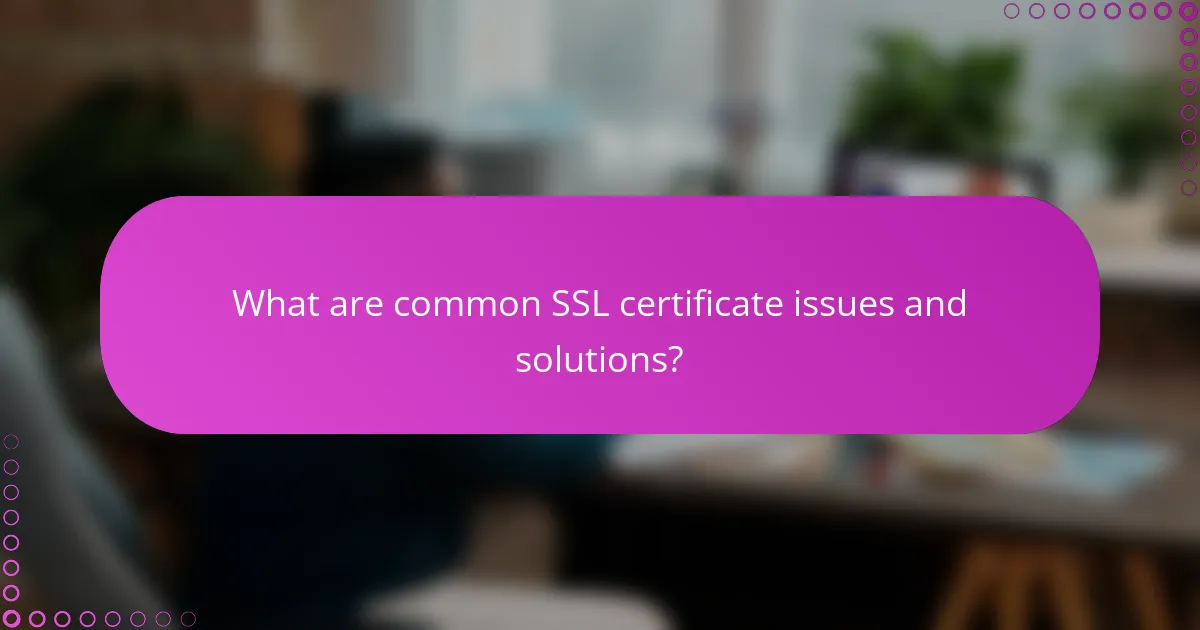
What are common SSL certificate issues and solutions?
Common SSL certificate issues include expiration, misconfiguration, and trust errors. Solutions often involve timely renewals, proper installation, and ensuring the certificate chain is complete.
Expired SSL Certificates
Expired SSL certificates can lead to security warnings and loss of trust from users. Regularly check the expiration date of your certificates and set reminders for renewal at least a month in advance.
To avoid issues, consider using automated tools that notify you of upcoming expirations. Many hosting providers offer SSL management services that can help streamline this process.
Misconfigured SSL Certificates
Misconfiguration can prevent secure connections, resulting in errors like “SSL Certificate Not Trusted.” Ensure that your certificate is correctly installed on your server and that the domain name matches the certificate.
Use online SSL checkers to diagnose configuration issues. These tools can help identify problems such as incomplete certificate chains or incorrect server settings.
Trust Errors
Trust errors occur when a browser does not recognize the SSL certificate authority (CA) that issued your certificate. This can happen with self-signed certificates or those from less-known CAs.
To mitigate trust errors, obtain SSL certificates from reputable CAs. Consider using widely recognized providers to ensure compatibility across different browsers and devices.






